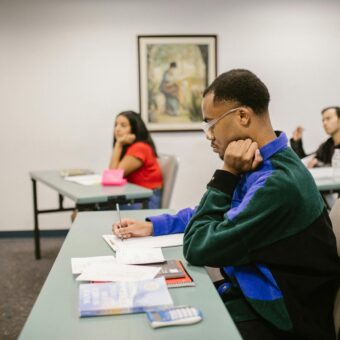
By Ana-Maria Buta, Academic Support Co-ordinator & PAT Lead at FSB Croydon, and Henry Qian, Academic Support Tutor at FSB Croydon, Article Date: 10/06/2024
In today’s dynamic educational landscape, particularly with the increasing popularity of student-centred pedagogical philosophy, academic support services have started to play a crucial role in enhancing student success and fostering a supportive learning environment (Bettinger et al., 2013; Mishra, 2020).
At FSB, comprehensive academic support is provided to students, equipping them with the tools and resources necessary to excel in their studies. This article explores the various ways in which our Academic Support Team supports students through academic skills development, engaging workshops, and structuring material, ultimately empowering them to achieve their academic goals.
Supporting Students with Academic Skills
One of the primary functions of our academic support services is to support students with their academic skills, particularly writing and researching, aiming at contributing to not only their current study at FSB but also long-term academic and professional endeavours.
Developed in the 1950s by educational psychologist Benjamin Bloom, Bloom’s Taxonomy provides modern educators with a framework for categorising educational objectives, including ‘remembering’, ‘understanding’, ‘applying’, ‘analysing’, ‘evaluating’, and ‘creating’, in a hierarchical order from most basic to most advanced cognitive skills (Krathwohl, 2002; Flinders and Uhrmacher, 2011).
At FSB, we also believe that the ultimate purpose of higher education is not to teach students how to meet assignment objectives, but essentially how to apply what they have learnt from the process of completing assignments into a practical setting. Assignments should, as we may argue, serve as tools for promoting learning and evaluating progress rather than the goal of higher education.
Following Bloom’s Taxonomy and belief at FSB, our academic support team has adopted the pedagogical approach that aims at not only equipping students with essential skills and knowledge to complete their assignments but also fundamentally promoting their cognitive abilities that can be applied to future endeavours in different settings (Valcke et al., 2009; Aheisibwe et al., 2021). Our approach can be generally categorised into six steps: ‘scaffolding’, ‘modelling’, ‘feedback’, ‘peer collaboration’, ‘reflection’, and ‘metacognition’. From understanding basic concepts to creating original work, and further to self-assessing own strengths and weaknesses, we aim at cultivating long-term learning capabilities for student’s future success.
Engaging Workshops
In addition to one-on-one support, a variety of workshops are offered to address specific academic needs and challenges. The topics cover a wide range of essential aspects, including time management, research techniques, critical thinking, CV writing, and academic referencing. These workshops provide practical strategies and tips to enhance academic performance and build essential skills for success. For instance, referencing is a critical aspect of academic writing: relevant workshops dedicated to practising referencing help students develop this essential academic skill and comprehend good academic practice. Led by experienced academic support tutors, students benefit from interactive learning experiences from the workshop (Jusslin and Widlund, 2021).
The design of our workshops is deeply influenced and built upon the basis of constructivism, particularly Experiential Learning Theory (ELT) by David Kolb and Social Learning Theory (SLT) by Albert Bandura. ELT emphasises the significance of exposing students to the real-world setting, conceptualising new ideas and applying learning outcomes to practical context, while SLT highlights the importance of social interactions and observational learning (Bandura, 1977; Sternberg and Zhang, 2001).
Arguably, both theories echo FSB’s belief in practising knowledge as well as the Academic Support Team’s student-centred pedagogical philosophy. In our workshops, we usually encourage students to work and discuss in small groups, where the idea exchange occurs, and knowledge is shared. We also focus on practical questions (e.g. what kind of transferrable skills can you highlight if you wish to work in the industry of health and social care?) and strategically prepare students for the real-world setting (e.g. we may ask students to role-play in a business interview scenario to be both interviewers and interviewees, so they can understand what skills may be desired and how they can highlight them from different perspectives).
Structuring Material
Many students struggle with organising and structuring academic material effectively. Our academic support services offer guidance on structuring learning material in a clear and logical manner. Assistance is provided in identifying key points, recognising and developing own critical arguments, and creating well-organised notes to ensure that learning material is comprehended in a helpful and constructive way.
As previously mentioned, this academic support service reflects our philosophy influenced by Bloom’s Taxonomy. In contrast, we not only guide students to scaffold their learning material but also continuously provide modelling and feedback to students so they can understand better what a solid academic piece of work should look like (Krathwohl, 2002; Flinders and Uhrmacher, 2011; Fisher and Justwan, 2017).
Conclusion
At FSB, comprehensive academic support services influenced by various pedagogical philosophies are provided to empower students to succeed in their studies. Through support with academic skills, engaging workshops, and guidance on structuring material, students can be equipped with the skills and resources necessary for academic success. By fostering a supportive and student-centred learning environment, we are committed to continuously promoting student success and excellence in higher education.
References:
Aheisibwe, I., Kobusigye, L. and Tayebwa, J. (2021). Bridging Education Gap in Higher Institutions of Learning Using Bloom’s Taxonomy of Educational Objectives. African Educational Research Journal, [online] 9(1), pp.69–74. Available at: https://eric.ed.gov/?id=EJ1285230 [Accessed 3 May 2024].
Bandura, A. (1977). Social Learning Theory. Englewood Cliffs, N.J.: Prentice-Hall.
Bettinger, E.P., Boatman, A. and Long, B.T. (2013). Student Supports: Developmental Education and Other Academic Programs. The Future of Children, [online] 23(1), pp.93–115. Available at: https://www.jstor.org/stable/23409490 [Accessed 3 May 2024].
Fisher, S. and Justwan, F. (2017). Scaffolding Assignments and Activities for Undergraduate Research Methods. Journal of Political Science Education, 14(1), pp.63–71. doi:10.1080/15512169.2017.1367301.
Flinders, D.J. and Uhrmacher, P.B. (2011). Curriculum and teaching dialogue. Charlotte, N.C.: Information Age Pub.
Jusslin, S. and Widlund, A. (2021). Academic writing workshop-ing to support students writing bachelor’s and master’s theses: a more-than-human approach. Teaching in Higher Education, 29(1), pp.1–18. doi:10.1080/13562517.2021.1973409.
Krathwohl, D.R. (2002). A revision of bloom’s taxonomy: An overview. Theory Into Practice, 41(4), pp.212–218. doi:10.1207/s15430421tip4104_2.
Mishra, S. (2020). Social networks, social capital, social support and academic success in higher education: A systematic review with a special focus on ‘underrepresented’ students. Educational Research Review, 29, 100307. doi:10.1016/j.edurev.2019.100307.
Sternberg, R.J. and Zhang, L.-F. (2001). Perspectives on thinking, learning, and cognitive styles. Mahwah, Nj: L. Erlbaum Associates.
Valcke, M., De Wever, B., Zhu, C. and Deed, C. (2009). Supporting active cognitive processing in collaborative groups: The potential of Bloom’s taxonomy as a labeling tool. The Internet and Higher Education, 12(3-4), pp.165–172. doi:10.1016/j.iheduc.2009.08.003.
